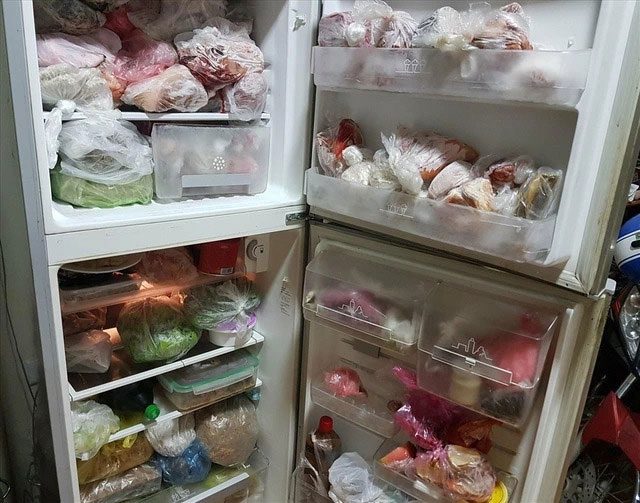Overloading your refrigerator with too many types of food can hinder the cooling process, leading to rapid spoilage and increasing the risk of food poisoning when consumed.
Mixing Different Foods
Many people mistakenly believe that simply placing food in the refrigerator will keep it from spoiling. Mixing meat, fish, vegetables, and leftovers is common. Some even leave food in the fridge for days on end. This behavior can lead to numerous cases of food poisoning and diarrhea.
Ms. Vu Thi Hoa (Nguyen Chi Thanh, Hanoi) shared that due to her cautious nature, she tends to buy large quantities of food during holidays, filling her refrigerator to the brim.
“Recently, hearing about the impending Yagi storm sweeping through the northern provinces, like many other housewives, I stocked up on food including meat, fish, vegetables, and eggs, filling my refrigerator,” Ms. Hoa recounted.
However, according to Ms. Hoa, her family experienced digestive disturbances yesterday, with some members suffering from stomach cramps and diarrhea. Fortunately, the symptoms were mild and resolved with medication.
After consulting a doctor, she learned that the cause of her family’s stomach issues might be a common mistake not only made by her family but by many others as well: storing eggs and milk in the refrigerator door. Constantly opening and closing the door causes temperature fluctuations that are not suitable for preserving these two types of food.
The refrigerator door is suitable only for long-lasting food items that can withstand temperature changes, such as spices and dry goods.
“Or I may have mixed raw foods with cooked foods, which increases the risk of food poisoning. Bacteria from raw meat, fish, and vegetables can easily contaminate cooked food,” Ms. Hoa explained.

Overloading the refrigerator with too much food can cause rapid spoilage and increase the risk of poisoning.
Thawing Food Multiple Times
In contrast to Ms. Hoa, Mr. Hoang Thi Nhung (Nui Truc, Hanoi) has a habit of thawing food multiple times.
“After returning from the market, I often place a large chunk of meat in the freezer. When I need it, I thaw it. If I don’t use it all, I put it back in the freezer again,” she explained.
However, experts warn that this practice is extremely dangerous.
Nutritionist Nguyen Thi Thu Huyen from Tam Anh General Hospital in Hanoi stated that re-freezing food allows bacteria that may still exist to thrive. It’s better to divide food into appropriate portions and use them up after thawing.
If you thaw too much, it’s advisable to place the excess in a tightly sealed food container, keep it separate from other food, and use it as soon as possible. Food that has been completely thawed and later warmed to room temperature or left outside the refrigerator for more than two hours should not be consumed.
Repeatedly thawing and refreezing food can lead to a loss of texture, flavor, appearance, and quality, diminishing its taste.
Improper Storage in the Refrigerator Can Lead to Poisoning
A refrigerator is an effective tool for preserving and storing food, especially during stormy seasons. However, just because food is stored in the refrigerator doesn’t mean it’s safe from food poisoning.
Dr. Truong Thi Minh Hien from the Nutrition Department at Thu Duc Regional General Hospital emphasizes that incorrectly storing food in the refrigerator can reduce its nutritional value and potentially generate harmful toxins.
Some tips for properly storing food in the refrigerator include: avoid overloading the refrigerator; clean the refrigerator every 3-6 months; organize food groups appropriately to prevent cross-contamination.
Furthermore, people should not keep food for too long, set appropriate temperatures for different types of food, and sort and package food before placing it in the refrigerator.
Dr. Hien also recommends the ideal temperatures for storing common foods as follows: Meat (below -12°C), thawed meat (0 to 4°C); fish and seafood (frozen -18°C, thawed 0 to 4°C); vegetables (0 to 4°C); milk and dairy products (2 to 4°C); eggs (3 to 5°C).
Experts warn that gastrointestinal infections have less impact on adults but pose serious risks to individuals with weakened immune systems, such as children and the elderly.
If not treated promptly, gastrointestinal infections can lead to many issues including irritable bowel syndrome, intestinal bleeding causing severe infections, inflammatory bowel disease, ulcerative colitis, and chronic gastritis.
Patients should consult a doctor if they experience symptoms of foodborne illness such as loss of appetite, headaches, nausea, or diarrhea. These symptoms typically manifest within 24 hours after consuming contaminated food, but can sometimes appear later, depending on the type of bacteria involved.


















































